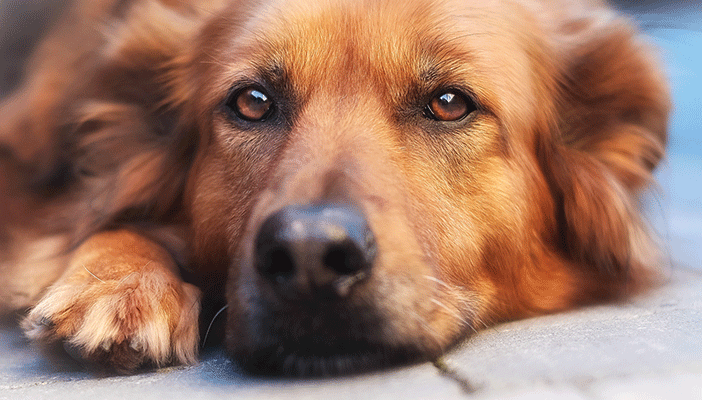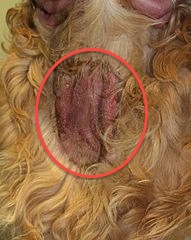
Hot Spots on Dogs: what they are, how to prevent them, and how to treat the hot spots once your canine gets one.
Have you recently found inflamed patches of raw skin on your dog’s body?
Finding your canine friend in painful agitation, licking and scratching at his skin can be difficult to endure. Understanding why it is happening and ways to prevent it can provide your beloved pet with soothing relief from these nasty skin irritations.
Hot spots, also known as Pyotramatic, Acute Moist Dermatitis, Moist Eczema or Summer Sores, are common self-inflicted wounds that occur when a dogs consistently scratch, lick or chew on their skin. Although hot spots on dogs can happen at any time, they are more prevalent in the summer months.
These small circular sores can occur anywhere on the body and will appear sensitive, painful and itchy. The lesions will commonly be red, hairless and moist with pus. The swollen patches of skin will leave dogs agitated and in pain, leading them to excessively lick the area. These spontaneous spots can grow quickly and will need treatment as soon as possible, as the skin can begin deteriorating within hours.
Why Do Hot Spots on Dogs Occur?

Hot Spots on dogs occur when the dog’s skin is highly irritated, developing inflammation at the site. Because the area is itchy, the dog will scratch and bite the spot persistently, sometimes self-mutilating themselves in the processes. Once the wound is open, it is susceptible to bacterial infections, causing excessive oozing and a foul odor.
The initial skin irritation can be caused by a number of factors such as:
- Environmental allergies including grass, weeds, mold dust, etc.
- Food allergies or a poor diet
- Prior skin infections, scrapes or wounds
- Neglectful grooming
- Fleas, mites and other dermatological parasites
- Insect bites or stings
Psychological factors that should also be considered are stress, boredom or anxiety.
Internal infections can also lead to hot spots on dogs, including ear or anal gland infections. A trip to the vet can help determine which of these factors is causing your dog’s sores.
Are Certain Dogs More Likely To Develop Hot Spots?
Since the hot spots are due to skin irritation, canines with heavy undercoats or long hair are more prone to developing them. These thick-coated dogs tend to get hot spots prior to shedding, when the wet, dead hair is confined near their skin.
Although they can occur anywhere, one common location in large breeds such as Newfoundlands and Golden Retrievers are under the earflaps due to the breed’s heavy and hairy ears.
If your dog has a history of ear infections or allergies, you should take extra precautions to clean their ears as well as groom them regularly.
How Are Hot Spots Treated?
Once you notice a hot spot on your dog, it is best to take them to the vet immediately, as the longer you wait, the more infected the lesion may become.
To heal your dog’s hot spots, your vet will:
- Shave or clip the infected area. This will allow air to the sore, drying out the excess pus and moisture. Light anesthesia may be necessary, depending on the severity and depth of the hot spot.
- Clean the lesion with a gentle shampoo or antiseptic spray.
- Administer medication such as a hydrocortisone cream to prevent itching. A cortisone injection may also be given to assist the healing process.
- Test your dog to determine the cause of the hot spots. These tests may include skin scraping, cultures, allergy or blood testing.
Once the hot spot is properly cleaned, your vet will offer a variety of treatment options to ensure a speedy recovery:
- Topical antibiotic ointment
- Oral antibiotic
- Medication to prevent skin parasites
- Elizabethan collar to prevent further licking and biting to the lesion
- Dietary supplements or diet adjustments
- Corticosteroids or antihistamines to prevent itching
Home remedies can also be used to keep your dog comfortable prior to or after you have visited your vet. These remedies are not intended to cure hot spots on dogs, as they will continue to occur if your pet is not taken to a vet to determine their underlying cause. These remedies will, though, assist in soothing your dog’s discomfort:
- Keep The Area Clean – It is important to keep the area clean with gentle non-irritating shampoo, water-based cleanser, or a salt water solution. Rinse the area and dry it gently.
- Use Positive Distractions – Ensure your dog does not continue to bite, lick or scratch the area. Keep their mind off of the itching by going for walk, playing in the park, etc.
- Tea Time – The tannic acids found in tea can be beneficial to hot spots on dogs as it assists in healing sores. Steep a non-herbal black tea bag in hot water, allow it to cool, and set the bag directly on the lesion for several minutes. This will dry out any excess moisture from the hot spot. Repeat this process multiple times a day.
- Try Some Witch Hazel – Witch Hazel can be used to soothe and cool the skin and/or infected area.
Keeping your dog calm and comfortable will allow them to heal quickly with minimal discomfort.
How Are Hot Spots Prevented?
Preventative treatments for hot spots will range depending on the cause.
With high humidity, be sure to thoroughly dry your dog’s coat after it has been exposed to water. Keeping your dog’s coat well groomed and free of any matting or dirt will help prevent any skin irritation.
A well-balanced diet can also help decrease skin problems in your dog. Adding a dietary supplement of omega fatty acids will give your dog a healthy coat while avoiding further issues with hot spots.
Look at what you are feeding your dog. What is the first ingredient listed on the label? This information is vital because the ingredients are listed in order of the amount contained in the food. So, when a label lists “beef” as the first ingredient and “corn gluten meal” as the second, this means that by weight, there is more beef than corn gluten meal found within the food.
Meat-based items such as chicken, beef, lamb or fish are crucial ingredients that should be listed first on your dog’s food label to ensure a healthy coat for your pet. If corn is listed, toss the bag and upgrade to a more quality, meat-based product.
Don’t forget to maintain your dog’s flea control medication! Allowing pesky fleas, mites and other parasites onto the skin can cause severe itching and discomfort, leading to hot spots on dogs.
Reduce their boredom and stress by allowing your pet time to play and exercise before placing them in a crate or bringing them indoors. These interactions will provide adequate mental and physical stimulation so your pet will not feel anxious and bored.
Knowing and understanding the issue is the most effective way to prevent these hot spots from occurring. A well-balanced diet, exercise, proper grooming and regular vet visits will keep your canine friend happy and free of skin irritations.








